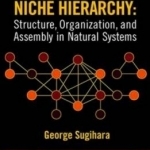
Fate of the Moon
Book
"You're a beautiful monster, and fate has bound us together for life." After the murder of his...
MM Paranormal Romance

iOrnament: draw creative geometry art
Education and Games
App
• What users say: "It's a universe of wonder", "Such a fun, beautiful and relaxing App.",...
Educator Stress: An Occupational Health Perspective: 2017
David J. Francis and Scott E. McIntyre
Book
This book brings together the most current thinking and research on educator stress and how...

Consumer Behaviour
Isabelle Szmigin and Maria Piacentini
Book
Presenting a brand new approach to teaching consumer behaviour, Szmigin and Piacentini move beyond...

Niche Hierarchy: Structure, Organization, and Assembly in Natural Systems
Book
This book is the 1982 Thesis of Dr. George Sugihara and represents an early attempt to produce a...

A Death at Crooked Creek: The Case of the Cowboy, the Cigarmaker, and the Love Letter
Book
"This is an extraordinary and ground-breaking book, a wonderfully creative mix of fact and theory,...

The International Business Environment
Leslie Hamilton and Philip Webster
Book
Will the expansion of the Chinese economy result in job losses in the USA? How can a natural...

Retail Marketing Management: Principles and Practice
Helen Goworek and Peter J. McGoldrick
Book
'Retail Marketing Management covers all the essential theories needed to understand the complicated...

BrainWave Tuner - Binaural beats & white noise
Health & Fitness and Medical
App
***29 + preset brainwave patterns. Nominated as ‘Best Healthcare and Fitness App’ by Handango....
Suswatibasu (1703 KP) rated Homo Deus: A Brief History of Tomorrow in Books
Jan 10, 2018
The implications for the developments in artificial intelligence and genetic engineering - and the combining of the two are mind-blowing and we ignore them at our peril. The same applies to the amount "the system" knows about us from how we use the internet. It is alarming how willingly we have walked down that path.
While Sapiens had a few historical tenets and facts that Harari was able to access with a clear argument, given his historian background, there was a tendency in this volume to set up unrealistic false dichotomies, and 'creatively' misinterpret belief systems in order to bolster his increasingly thin argument.
The thrust of what Harari is saying may well be true, but what I would have liked to see him do is to discuss the implications a bit more thoughtfully and, in effect, set an agenda for discussion.

